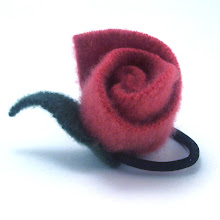 ... is the new black
... is the new black
Upscale shoppers are embracing artisans’ wares over those mass-produced. Score one for the American entrepreneur.
By Laura Vanderkam
Like many parents, when Joe and Amy Sharp of
But how? Opening a store required capital. Selling at fairs took time. Maintaining a website necessitated skill — plus marketing expertise to draw traffic.
Fortunately, there was another option: launching a store on
They're not the only success story. As retail overall has been flat, Etsy's sales have risen fast enough (more than 100% in 2009 to $181 million) and enough other players, from BigCartel to iCraft.ca and Lov.li,have entered the craft portal space to suggest that consumers who still have disposable income increasingly want items like the Sharps' toys — that is, goods with stories behind them.
Buying in a 'special' world
"There's a little bit of a big-box backlash going on," said Jennifer Perkins, host of the DIY network show Craft Lab (and proprietor of the Naughty Secretary Club story on Etsy). It is, in some ways, simply a redirected snobbiness in an era when, as designer Tory Burch said recently, "it's not cool to be excessive anymore." But since the lust for all things handmade is giving American artists a real chance to make a living in these bleak times, it's far preferable to wanting to tote the same
Etsy — founded by 20-something Brooklyn guys with eccentric tastes and sharp business instincts — and its brethren arrived at a fortuitous time. Consumers have grown accustomed to having high quality goods available whenever they want, and so, next, "we are increasingly engaged in making our world special," noted economist
At the same time, Americans like Hayes, who did medical billing before heeding her calling as a potter, increasingly want to do creative, fulfilling work. That desire coincides neatly with a widespread need, in tough times, to augment the family budget. Throw in technology platforms that are relatively cheap (Lov.li and Etsy both charge 3.5% commissions, well below the 50% galleries often charge) and nearly idiot-proof, and soon you have hundreds of thousands of people listing their jewelry, pottery, wall art, hand-knit scarves and sweaters, and clamoring for inclusion in a weekly feature on Etsy's blog, The Storque, called "Quit Your Day Job"
Growing more hands
Of course, the majority of sellers on craft portals such as BigCartel or Etsy don't make enough to turn their decorated salt shakers or embroidered picture frames into livelihoods. Even the successful ones soon bump into the reality that we transitioned out of a handmade economy back in the 19th century for a reason: It's beastly hard to scale up.
Brandi Nelson and Brent Koby, whose Kukubee line of cartoon-covered pouches ($12 each) has been another top Etsy seller, told me that they are struggling with this question — how to meet burgeoning demand while staying committed to making affordable handmade goods. Koby joked that Nelson, the company's seamstress, should get a "six-arm implant." More realistically, "for us to expand, we will eventually need to bring in people who share the same passion for handmade as we do." The Sharps likewise plan to add staff to their workshop in Columbus, where they continue to crank out heirloom teethers and rattles ($12-$24)made of wood sourced from a farm 45 minutes from town. That's great, except that hiring Americans is expensive. That's why many manufacturers eventually outsource production to overseas factories. Long run, it will not work for Etsy to bill itself, as it has in puzzling fashion until recently, as a place for bargain hunters.
But that's not a bad thing — no one needs anything sold on most craft portals anyway. Instead, they're a great alternative for recreational upper-income shoppers who, as Saks CEO Stephen Sadove recently said, want to "get something they can't get elsewhere." He wanted them to fill that need at Saks. It would be better for America's growing artisan class if shoppers filled that need at places like Etsy instead.
Laura Vanderkam, author of the forthcoming book 168 Hours, is a member of USA TODAY's board of contributors.

No comments:
Post a Comment